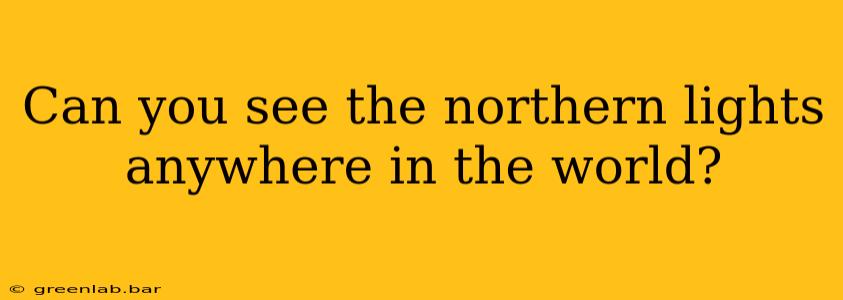Can You See the Northern Lights Anywhere in the World? A Guide to Aurora Borealis Viewing
The Northern Lights, or Aurora Borealis, are a breathtaking natural phenomenon that captivates hearts and inspires awe. But can you see this celestial display from anywhere on the planet? The short answer is no. The aurora's visibility is highly dependent on several crucial factors. This guide will delve into where you can witness this magical spectacle and what conditions are necessary for optimal viewing.
Understanding the Science Behind the Aurora
Before we explore locations, understanding the science behind the aurora is key. The Northern Lights are created when charged particles from the sun (the solar wind) interact with the Earth's atmosphere. These particles are channeled towards the poles by the Earth's magnetic field, colliding with atoms and molecules in the upper atmosphere. This collision excites these atoms, causing them to release photons – light – creating the mesmerizing curtains of light we see in the night sky.
Prime Locations for Aurora Viewing
The best places to see the Northern Lights are located in high-latitude regions, within the auroral oval – a ring-shaped zone around the magnetic poles. These regions include:
-
Alaska, USA: Fairbanks is a popular destination, known for its high chances of aurora sightings. Other Alaskan locations, especially in the interior, also offer excellent opportunities.
-
Canada: Yellowknife, in the Northwest Territories, is renowned for its clear skies and high aurora activity. Other areas in Yukon and northern Alberta also provide fantastic viewing possibilities.
-
Iceland: Iceland's location makes it an ideal spot for aurora viewing, with many locations offering stunning displays against the backdrop of glaciers and volcanoes.
-
Greenland: This vast island offers incredibly dark skies and opportunities for truly unforgettable aurora experiences.
-
Norway: Tromsø, the "Arctic capital," is a prime location, offering various tours and activities related to aurora viewing. Other northern parts of Norway, such as the Lofoten Islands, also provide excellent viewing chances.
-
Sweden: Northern Sweden, particularly Abisko National Park, is known for its exceptionally clear skies, making it a fantastic location for aurora viewing.
-
Finland: Lapland, in northern Finland, provides numerous opportunities to witness the aurora, often in combination with winter activities like snowmobiling or reindeer sledding.
-
Russia: Northern regions of Russia, such as Murmansk, also fall within the auroral oval and offer possibilities for seeing the aurora.
Factors Affecting Aurora Visibility
Even in prime locations, several factors can influence whether you see the aurora:
-
Solar Activity: The intensity of the aurora is directly related to solar activity. Stronger solar storms lead to brighter and more vibrant displays. You can check space weather forecasts to predict aurora activity.
-
Darkness: You need a dark sky to see the aurora. Light pollution from cities dramatically reduces visibility. Therefore, venturing away from urban areas is crucial for optimal viewing.
-
Clear Skies: Clouds will completely obscure the aurora. Checking weather forecasts is essential to ensure clear skies during your viewing attempt.
-
Time of Year: The best time to see the aurora is during winter (typically September to April in the Northern Hemisphere), when nights are long and dark.
Tips for Maximizing Your Chances of Seeing the Northern Lights
- Plan your trip during peak aurora season (September-April).
- Choose a location with minimal light pollution.
- Check space weather forecasts and aurora predictions.
- Be patient – aurora displays can be unpredictable.
- Dress warmly; winter nights in the far north can be extremely cold.
While the Northern Lights aren't visible globally, with careful planning and consideration of the factors mentioned above, you can greatly increase your chances of witnessing this spectacular natural wonder. So, start planning your adventure to one of these magical locations and prepare to be amazed!

